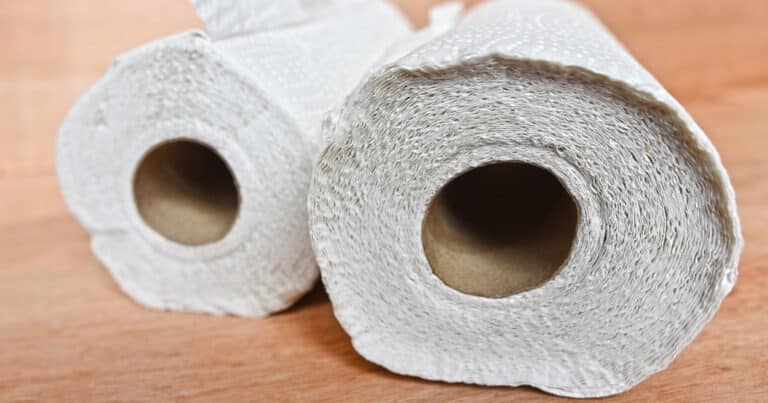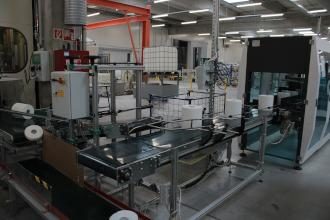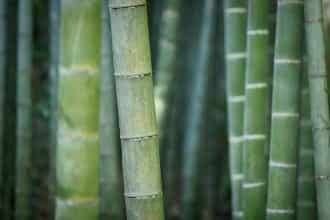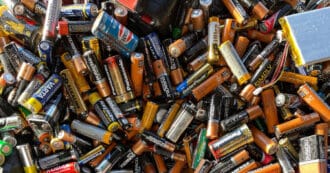By Harry Cooper – Paper pollution has become a striking issue in today’s world. Not only does paper requires thousands of trees to be cut down every day but when it’s discarded it winds up in our landfills, water, and natural environment.
A Solution to Paper Towels
Luckily there are alternatives such as reusable paper towels that don’t need to be thrown away or require so many trees to be cut down. Along with these are other sustainable options are biodegradable bamboo paper towels that don’t require any wood to make.
Paper Pollution
Paper towel waste is a significant problem in today’s world. However, paper towels are only one part of a broader problem of paper pollution, and it is important to understand just how much of an impact paper can have on our planet.
Deforestation for Paper Towels
One of the biggest issues created by large-scale paper production is deforestation. This destroys hundreds of habitats and destroys one of our planet’s greatest natural defenses against carbon.
Deforestation has become so much of a problem that on average 80,000 acres of forest are torn down every day for the sake of producing wood products. This is especially relevant to paper, as 40% of all wood cut down from trees goes towards creating paper.
As far as how paper towels fit into this, 51,000 trees of the 80,000 acres cut down each day go towards making paper towels. Thus the paper towel is in part responsible for the habitat destruction and the carbon footprint created by deforestation.
Water and Soil Pollution Caused by Paper Towels
The extraction of natural resources to create paper creates some serious environmental issues. Along with this, the actual production of paper products requires the use of non eco friendly chemicals that can get into the water, soil, and environment in general when paper products are made and thrown out.
In order to make paper towels, the wood pulp extracted from trees must be treated in a certain way before it can be made into the final product. This process of treating wood pulp involves using chemicals such as formaldehyde and chlorine bleach. These chemicals can cause numerous health problems such as cancer, hormone disruption, birth defects, reduced fertility, and immune system impairment.
These chemicals can come into contact with humans in various ways, such as using paper towels to wash our hands or when we rinse our food. These chemicals are not only harmful to humans, but when paper towels are thrown away, the chemicals in paper towel waste can leak into soil and or water. This exposes the harmful chemicals in paper towels to the environment and wildlife.
Water and Energy Usage to Produce Paper Towels
Another environmental effect of paper production is the amount of resources it uses other than wood from trees. The two most notable of these resources are water and energy.
Our world is already plagued by fossil fuel burning and the lack of access to clean water. And it doesn’t help that excessive paper production greatly contributes to both problems.
The paper industry uses about 4% of the world’s energy. Because of this, paper production ends up being the fourth biggest contributor to greenhouse gas emissions.
Along with using extensive amounts of energy, paper production uses massive amounts of freshwater. Even when we look at just paper towels, the process that turns wood pulp into paper towels requires polluting 20,000 gallons of freshwater per one tone of paper towels.
Reusable Paper Towels
One of the most feasible solutions to our world’s paper towel problem is using reusable paper towels. Unlike traditional paper towels, reusable towels give more usage per towel and require less resources to be produced, resulting in less deforestation, less pollution, and less water and energy usage.
How Reusable Paper Towels Work
Reusable paper towels are similar in concept to regular dish towels. Made from cotton, cellulose, or another durable material, these reusable towels are made more durable than regular paper towels and are meant to be used for multiple kitchen tasks before being washed in a dishwasher or by hand and then being left air dry like any other kitchen cloth.
Reusable towels still have their flaws, they will need to be thrown out eventually from overuse, and can be annoying or hard to get used to at first. But at the end of the day, they are much more efficient than regular paper towels, which cause environmental harm at every stage of production.
Less Deforestation To Produce Reusable Towels
Thousands of trees are cut down to supply our daily paper towel fix. However, since most reusable towels don’t require any wood at all to make them, using them can be a great way to combat deforestation.
The average reusable towel is made of a material called diaper cloth. Diaper cloth is a flannel like fabric made from a special cotton called Birdseye cotton. Since reusable paper towels are made from materials entirely different from wood, such as cotton, they don’t require a single tree to be cut down. Thus, if everyone switched to reusable paper towels, no deforestation would be required to make such a common cleaning commodity.
Less Pollution To Produce Reusable Towels
Many producers of reusable paper towels make them with helping the environment in mind, and try and make them as sustainable as possible. Thus, many producers of reusable paper towels will only make them with sustainable organic materials. This means that reusable paper towels normally won’t contain the harmful chemicals found in traditional paper towels, making them an environmentally friendly alternative that won’t harm the environment or the people using them.
Since one reusable paper towel can get the job done of multiple ordinary paper towels, they require a lot less resources overall. This means by simply using less towels overall by switching to reusable eco- friendly paper towels, we are able to cut down on usage of resources such as water and energy, which ordinary paper towel production uses a lot of.
Bamboo Paper Towels
While reusable paper towels are a great way to cut down on paper waste, there are other tree free paper towels that can clean up messes without harmful environmental consequences in addition to reusable paper towels. One such eco friendly alternative is paper towels made from bamboo. Bamboo products have started being used as a sustainable alternative many wood based products. Everything from toilet paper to flooring is being made from the tall stalky plant in hopes of replacing their unsustainable wooden alternatives.
Bamboo has proven itself a much more efficient and environmentally friendly alternative to traditional wood products. Since bamboo comes from a grass, it requires very little trees to be cut down in order to make products out of it. Bamboo also grows a lot faster and a lot easier than trees. Because of this, it gives us more usable pulp to create products than trees, and does not require many fertilizers in order to grow and doesn’t need to be replanted. On top of that, bamboo is also a lot more biodegradable than wood products and goes through the decomposition process much faster, meaning that waste from these products is much less of an issue.
The only downside to bamboo products is that they might not always be as eco friendly as they might seem. While not using wood may seem like it would help to stop deforestation, but farming bamboo can sometimes help contribute to it. The primary issue with bamboo products is that in order to farm it forest ecosystems often need to be cut down in order to make way for monoculture plantations. However, even though forests are cut down to make way for bamboo plantations, bamboo products still cause less deforestation and create less waste than traditional wood products.
Sustainable Alternatives to Paper Towels
Both bamboo paper towels and reusable paper towels are more sustainable than regular paper towels, but reusable paper towels made from bamboo are a good way to gain the environmental benefits of both.
Buying a roll of reusable cloths or a pack of reusable towels, instead of paper towels, also helps the consumer to save money. If you follow the care instructions that prevent fraying of the cloth towels they are extremely durable, compared to regular single use kitchen towels.
Reusable paper towels made from bamboo are highly absorbent but don’t need to be produced as often making their less of a need for bamboo farms that destroy forests. Additionally, these paper towels are also biodegradable, meaning less waste is created from the few times you need to throw away your reusable paper towels. This helps in reaching our zero waste goals. That’s two great benefits of reusable towels for the environment!
Religion and Paper Towels
Rabbi Marc D. Angel discusses in an article on JewishIdeas.org what he calls “the paper towel syndrome.” Rabbi Angel explains this phenomenon in the following manner:
Paper towels are used and then tossed away without an afterthought. They are expendable. Once people have gotten what they need, they unceremoniously discard the used paper. The paper towel syndrome manifests itself when people exploit others, squeeze out whatever benefit they can derive, and then discard these people and forget them fairly quickly. In a healthy society, people are valued as human beings; they are respected and appreciated. In an unhealthy society, people are treated like paper towels—exploited, tossed away, and forgotten.
Rabbi Angel discusses this phenomenon in reference to the Biblical character of Joseph who is used and abused by his brothers, Pharaoh’s butler and Pharaoh himself.
How we treat things is a reflection of how we treat people and vice versa. Building a habit of caring for the people and things in our life is a great way to make a healthier, happier and more sustainable world.
* Featured image source
Click here to learn more about renewable and non-renewable resources.








